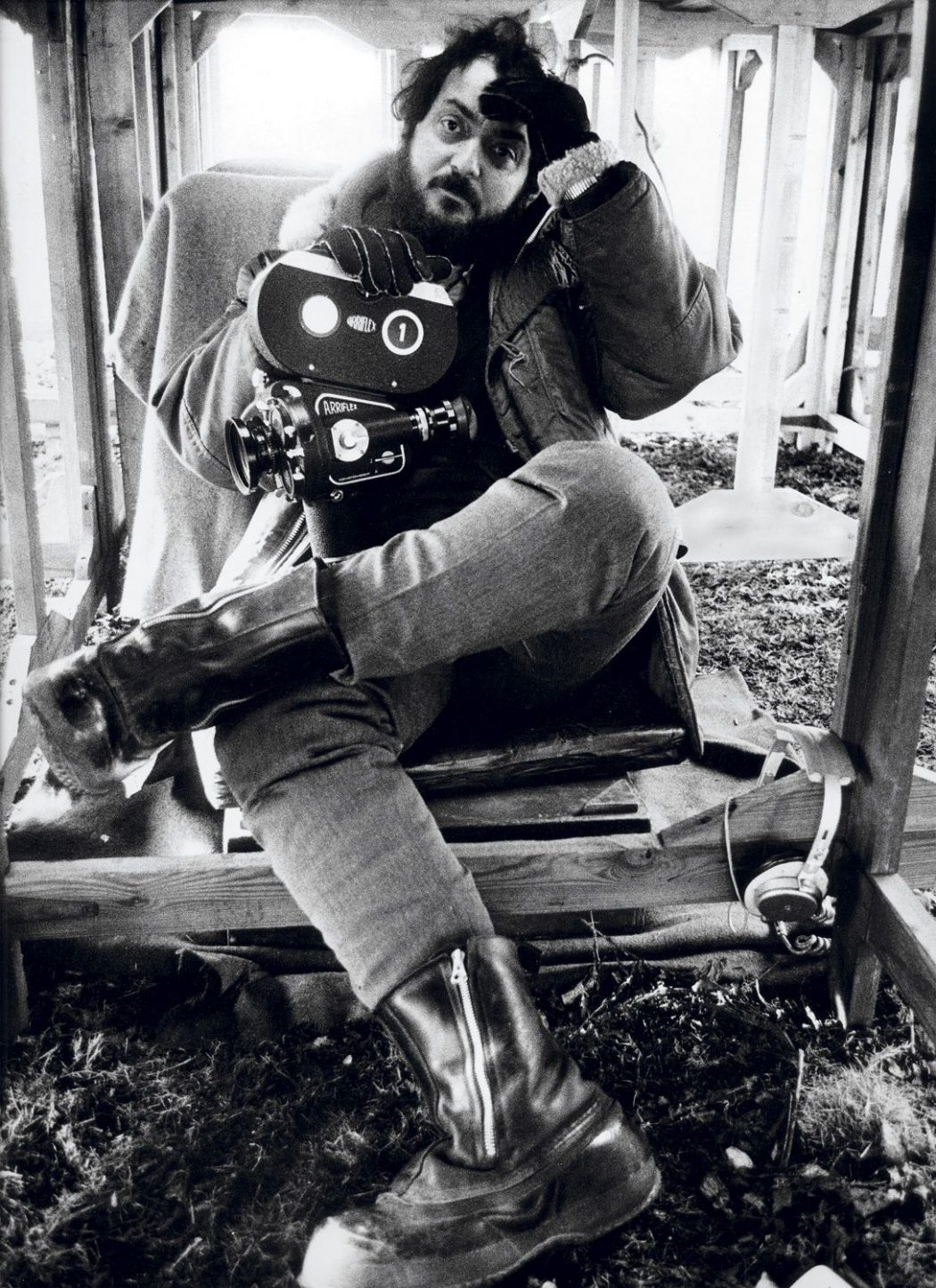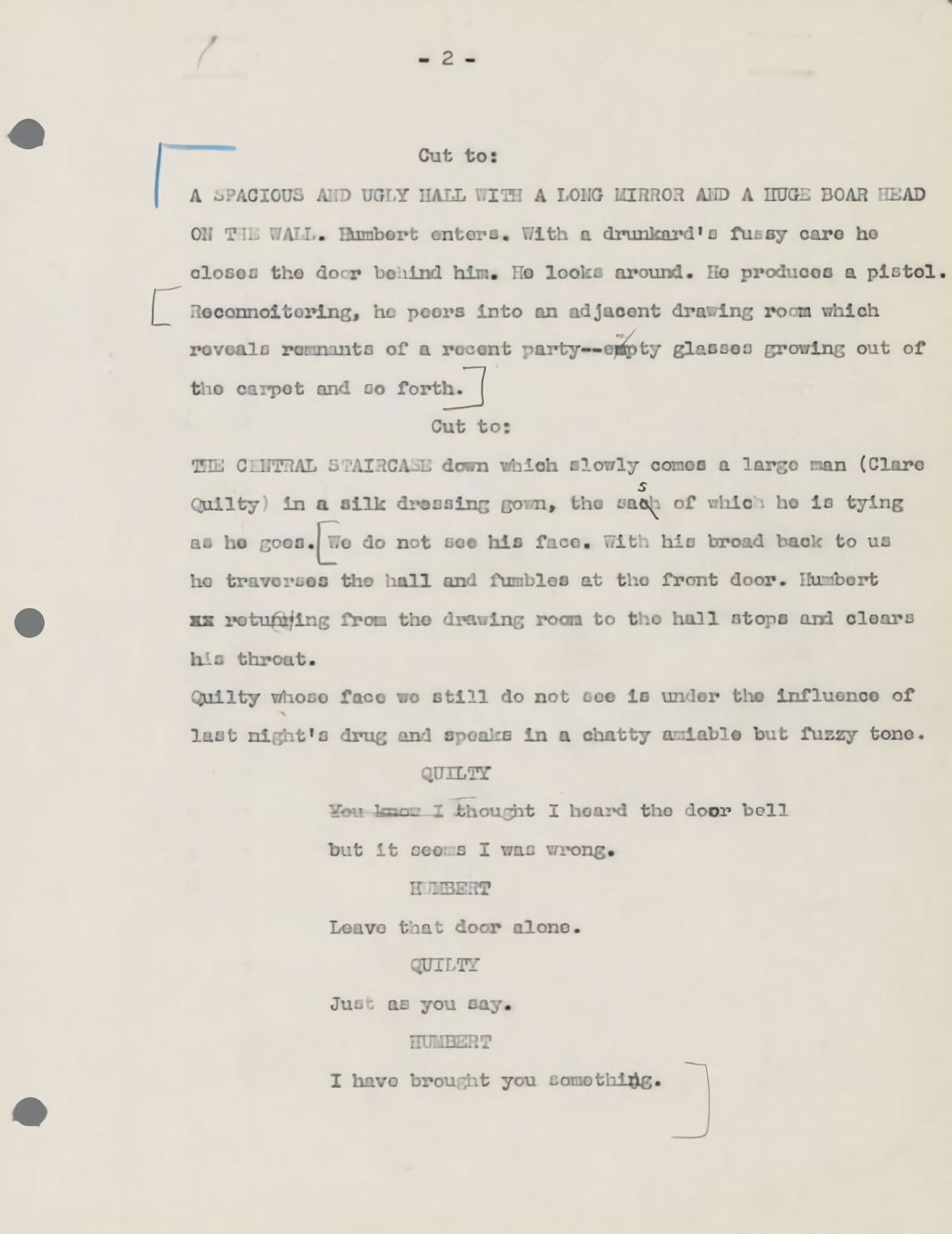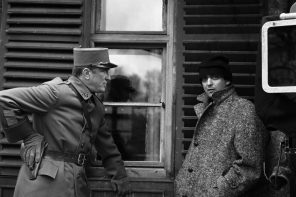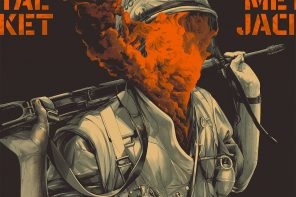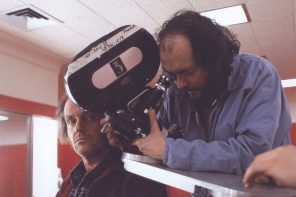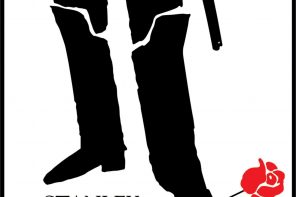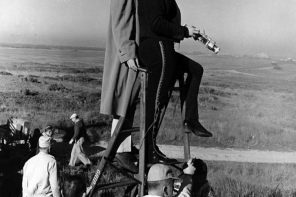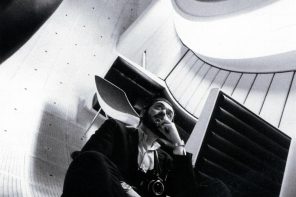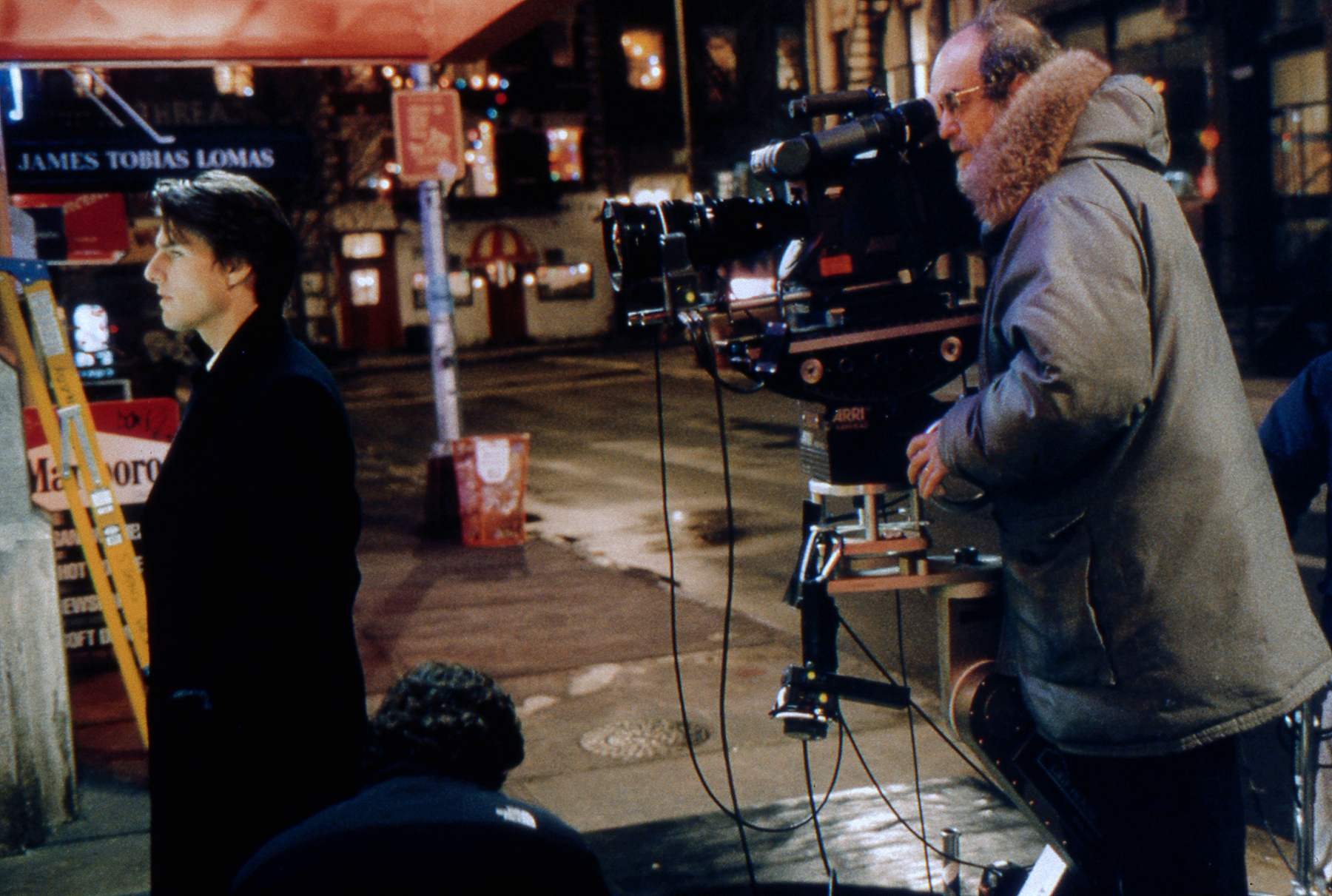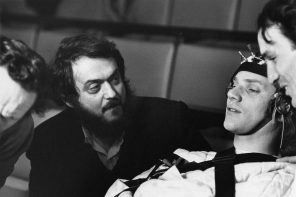All the essential documentaries on Stanley Kubrick, including Stanley Kubrick: A Life in Pictures (2001), Stanley Kubrick’s Boxes (2008), A la Recherche de Stanley Kubrick (1999), The Art of Stanley Kubrick: From Short Films to Strangelove (2000), Cinefile: Stanley Kubrick: The Invisible Man (1996), rare Dutch documentary, Without Walls: Forbidden Fruit (1993), Full Metal Jacket: Between Good and Evil (2007), Great Bolshy Yarblockos! Making A Clockwork Orange (2007), Stanley Kubrick’s big interview with The New Yorker, 2001: The Making of a Myth (2001), Making The Shining (1980), Steven and Stanley, Remembering Stanley Kubrick: Steven Spielberg (1999), Barry Lyndon production, The Visions of Stanley Kubrick (2007), Lost Kubrick: The Unfinished Films of Stanley Kubrick (2007), and Inside: Dr. Strangelove or How I Learned to Stop Worrying and Love the Bomb (2000).
It’s a terrific 142 minute documentary feature that goes into absolutely every detail of the career of Kubrick, with new footage from the archives that has never been seen previously. The film starts with a look at Kubrick’s childhood and initial interest in photography that brought him towards cinema. The documentary takes a look at all of the director’s films, giving an equal focus to everything from the first—Fear and Desire towards the final—Eyes Wide Shut. Narrated by Eyes star Tom Cruise, the documentary features interviews from many, many people from the director’s past, from Malcolm McDowell to Sydney Pollack to Cruise to Martin Scorsese and Steven Spielberg. The documentary even talks about the projects that the director had in development, such as A.I., which was recently directed by Steven Spielberg. The amazing thing about the documentary is the behind-the-scenes footage that has never been seen before. Combined with the interviews with friends and family, the feature opens up a previously unseen, warmer side of the director—telling us more about the creative process and personal life of the director that was never really shared before. There’s some especially funny stories at times, especially one shared by Sydney Pollack, who didn’t know what to expect from working as an actor on Eyes Wide Shut—and thought he’d be done with his part in a week. A Life In Pictures must have taken an enormous amount of work and effort to complete, not only to get the interviews together, but to find all of the footage and rare material that has gone into the documentary. It generally gives an equal look towards all of the director’s works, and I’m sure that even the biggest fans of the director will likely find some new tidbits and information within this superb feature. —A Guide To Current DVD Review
Stanley Kubrick’s films were landmark events—majestic, memorable and richly researched. But, as the years went by, the time between films grew longer and longer, and less and less was seen of the director. What on earth was he doing? Two years after his death, Jon Ronson was invited to the Kubrick estate and let loose among the fabled archive. He was looking for a solution to the mystery—this is what he found. —The Guardian, Citizen Kubrick
A French documentary about Stanley Kubrick and Eyes Wide Shut. Many people discuss the director’s films: Frederic Raphael, Terry Semel, Jan Harlan, Diane Johnson, etc.
A short 14 minute documentary on legendary director Stanley Kubrick (2001, A Clockwork Orange, The Shining) covering his early career through his short works, through The Killing, Spartacus, Paths of Glory, and Lolita, to Dr. Strangelove. Includes commentary on his work and exclusive photos, footage, and interviews.
This 1996 documentary profiles the work of director Stanley Kubrick and was broadcast to accompany a season of Kubrick films on Britain’s Channel 4.
Rare Dutch TV documentary about Stanley Kubrick. Features behind the scenes footage of 2001: A Space Odyssey as well as a very insightful interview by Kubrick at the premiere of the film. An interview with proposed star of the unmade Aryan papers, Johanna ter Steege, who talks about how Schindler’s List effectively caused Kubrick to cancel his own Holocaust epic and Malcolm McDowell talks about working on A Clockwork Orange whilst in Venice in 1997. Interviews: Stanley Kubrick, Peter Delpeut, George Sluizer, Harry Kumel, Johanna ter Steege and Malcolm McDowell.
Today this special really has no meaning beyond that of a nostalgic one. Due to the untimely death of Stanley Kubrick in 1999 The Ban was lifted and the film can now be shown in Britain. Even worse is the bulk of the youth today do not even get the film. Like The Return of ACO special this remains a look back at The Ban which at the time of the special was around it’s 18th anniversary. Overall the special just seems like it was taking a shot a Kubrick, to make him look silly for banning it, in the hopes to get him to lift The Ban. It’s amazing to me that they do show a clip of the Billboy fight complete with the nude girl on regular TV. One of the highlights of the special is the inclusion of two rare interviews by actors you rarely see talk about the film. Miriam Karlin who played the Cat Lady and Steven Berkoff who played the CID man. This is the first time I had seen the two speak on camera about ACO and it made the whole thing very worthwhile. Once again Kubrick’s friend Alexander Walker was on hand to discuss the film. The other highlight was a first attempt at filming some of the 21st chapter. Tony sits in their homemade Korova set reading the paper as the narration from the book is played and when Alex talks about a wind-up toy one is shown that even has a bit of a droogie style to it. It is a fun look at what could’ve been if Kubrick felt as attached to the 21st chapter as I am. In conclusion it is way too short, but does cover the all the bases. An interview with Malcolm is greatly missed as well as any official comment by the Kubrick family. Even at the end the host says Kubrick won’t even say why he has banned the film so at the time it was all still a mystery. I have to disagree with Walker when he says the film is like a musical. One scene does not a musical make. If he was talking about ACO the play that is another story. As they say it is good as far as it goes even trying to show the futility of the ban. The host is shown reading the book on a bus and going to France to see the film in the theater where it is always playing as well as going into a store and buying the video. This shows how easy it is to obtain the forbidden fruit and bring it back home. He admits the film struck a nerve more with the British than anywhere else upon its’ release and that is why they need it back. It seems a bit childish and harsh to call Kubrick out to explain why he banned the film, after all, it wouldn’t change anything and it wasn’t until after he died we found out. —Alex D. Thrawn
Follow Stanley Kubrick as he creates his savage and brilliant Vietnam film, hewing closely to the theme that dominated his creative life for four decades — the duality of human nature. Poised between good and evil, mankind was, in Kubrick’s view, a complex creature equally capable of unspeakable savagery and heart-melting tenderness. Full Metal Jacket would make his case in vivid, blood-soaked Technicolor. Through interviews with Kubrick’s collaborators and cast members, including Vincent D’Onofrio, Lee Ermey and Adam Baldwin, this documentary reveals how Kubrick’s brilliant visual sense, astute knowledge of human nature, and unique perspective on the duality of man came together to make Full Metal Jacket an unforgettable cinematic experience, taking its place in his “war trilogy” alongside cinematic landmarks Fear and Desire and Paths of Glory.
30-minute documentary Making A Clockwork Orange.
2001: The Making of a Myth, an exquisite 43-minute documentary produced in 2001 which wonderfully covers the movie’s themes and technique. Introduced and narrated by James Cameron, the piece includes new interviews with author/screenwriter Arthur C. Clarke, members of the crew and cast (not just the obvious like Keir Dullea, but even a space stewardess and two apes), and critics. They all shed lots of light, from interpretations to production tales.
Stanley Kubrick allowed his then-17-year-old daughter, Vivian, to make a documentary about the production of The Shining. Created originally for the BBC television show Arena, this documentary offers rare insight into the shooting process of a Kubrick film. This version of the documentary has commentary by Vivian Kubrick.
Steven Spielberg talks about the making of A.I and the chemistry he had with Stanley Kubrick.
An interview with Steven Spielberg about Stanley Kubrick. This is the uncut version of the interview, aired on British television. The interview is excerpted in the Eyes Wide Shut DVD.
Documentary excerpt detailing the production of Barry Lyndon.
A concise look at some of the more bizarre visual aspects of The Shining. Through interviews with collaborators, current filmmakers and authors, we’ll examine how Kubrick used his unique brand of visual storytelling to convey madness, evil, and the power of the supernatural without relying on dialog or conventional exposition. As much as any film he ever made, The Shining illustrates Kubrick’s talent for using the language of pure cinema to tell his stories.
A behind-the-scenes documentary about the making of one of the classics of modern cinema. Including interviews with many members of the cast and crew of this story about the scramble by the heads of state to head off a rogue general’s attempt to launch a nuclear war, this film gives fans a wealth of new information on the work and effort that went into bringing the film to fruition.
Narrated by Malcolm McDowell, this short documentary examines the films Stanley Kubrick developed but didn’t live long enough to make. Features interviews given by Kubrick’s longtime producer Jan Harlan, Jack Nicholson, Sydney Pollack. Through interviews and abundant archival materials, this documentary examines these “lost” films in depth to discover what drew Kubrick to these projects, the work he did to prepare them for production, and why they ultimately were abandoned. Some of the unfinished project discussed here are Napoleon, The Aryan Papers and also A.I (which we know finally made by Steven Spielberg).
Get Cinephilia & Beyond in your inbox by signing in
[newsletter]
